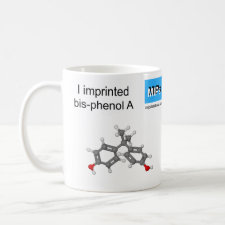
Authors: Yang Q, Wu XQ, Peng HL, Fu LW, Song XL, Li JH, Xiong H, Chen LX
Article Title: Simultaneous phase-inversion and imprinting based sensor for highly sensitive and selective detection of bisphenol A.
Publication date: 2018
Journal: Talanta
Volume: 176
Page numbers: 595-603.
DOI: 10.1016/j.talanta.2017.08.075
Alternative URL: https://www.researchgate.net/publication/319307546_Simultaneous_phase-inversion_and_imprinting_based_sensor_for_highly_sensitive_and_selective_detection_of_bisphenol_A
Abstract: A novel recognition element of molecularly imprinted films (MIFs) was synthesized by wet phase inversion (WPI) on the surface of Ti/TiO2 electrode for highly selective and sensitive electrochemical detection of bisphenol A (BPA). The Ti/TiO2/MIFs sensor was constructed by casting the precursor poly(acrylonitrile-co-acrylic acid) (p(AN-co-AA)) in dimethyl sulfoxide containing template molecule BPA onto the electrode and then immersing into water, resulting in simultaneous p(AN-co-AA) precipitation and BPA imprinting via the facile WPI. The imprinted sites could selectively rebind BPA through hydrogen bonding and hence lead to the equalizing current increase in amperometric detection, by which the BPA could be sensed electrochemically. Accordingly, the Ti/TiO2/MIFs sensor offered a favorable linearity within the wide range over five orders of magnitude (4.4 nM - 0.13 mM), and a low detection limit down to 1.3 nM. Excellent recognition selectivity for BPA was also attained over its analogues. Furthermore, this sensor was successfully applied to detect BPA in seawater and paper cup samples, and high recoveries were 86-110% with low relative standard deviations of 1.3 - 3.2%. By using BPA as a model, the MIFs-based method may provide a facile, rapid, and cost-effective way for ultrasensitive electrochemical measurements of various targeted compounds with good applicability to WPI
Template and target information: bisphenol A, BPA
Author keywords: Wet phase inversion, Molecularly imprinted films, electrochemical detection, Ti, TiO electrode, bisphenol A



Join the Society for Molecular Imprinting

New items RSS feed
Sign-up for e-mail updates:
Choose between receiving an occasional newsletter or more frequent e-mail alerts.
Click here to go to the sign-up page.
Is your name elemental or peptidic? Enter your name and find out by clicking either of the buttons below!
Other products you may like:
 MIPdatabase
MIPdatabase









